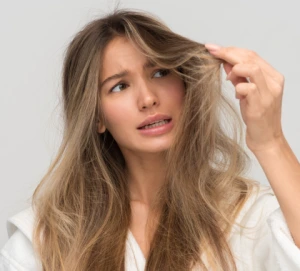Hair loss is a common concern for women worldwide, often causing emotional distress and a loss of confidence. While hair thinning or shedding can occur for various reasons, understanding the underlying cause is crucial for selecting the best treatment. This comprehensive guide explores effective treatments and lifestyle changes that can combat female hair loss.
Causes of Hair Loss in Women
- Hormonal Imbalance: Conditions like polycystic ovary syndrome (PCOS) and menopause can lead to significant hair thinning.
- Nutritional Deficiencies: A lack of essential nutrients such as iron, vitamin D, and biotin can weaken hair health.
- Stress: High stress levels can trigger telogen effluvium, a condition where hair enters the shedding phase prematurely.
- Medical Conditions: Autoimmune disorders like alopecia areata or chronic illnesses can contribute to hair loss.
- Genetics: Female pattern baldness, also known as androgenetic alopecia, is often hereditary.
- Hair Treatments and Styling: Frequent use of heat tools, harsh chemicals, or tight hairstyles can damage hair over time.
Diagnosis of Hair Loss
Before beginning any hair loss treatment, it’s essential to identify the cause. A dermatologist or trichologist may perform the following:
- Scalp Examination: To identify thinning patterns or scalp conditions.
- Blood Tests: To detect nutritional deficiencies or hormonal imbalances.
- Biopsy: In rare cases, a scalp biopsy may be necessary to diagnose specific conditions.
Top Treatments for Female Hair Loss
1. Medications
- Minoxidil (Rogaine): Approved by the FDA, this topical treatment stimulates hair growth and slows down hair loss. It’s applied directly to the scalp and shows noticeable results within three to six months.
- Anti-Androgens: Medications like spironolactone help block the effects of androgens that can lead to hair loss in women with hormonal imbalances.
- Oral Supplements: Biotin, zinc, and iron supplements can significantly improve hair health if deficiencies are the underlying cause.
2. Platelet-Rich Plasma (PRP) Therapy
PRP therapy involves drawing a small amount of your blood, processing it to isolate growth factors, and injecting it into the scalp. This stimulates hair follicles, promoting growth and thickness.
3. Hair Transplant Surgery
For advanced cases of hair loss, a hair transplant may be the best solution. Techniques like Follicular Unit Extraction (FUE) or Follicular Unit Transplantation (FUT) relocate hair follicles from denser areas to thinning or balding regions.
4. Low-Level Laser Therapy (LLLT)
LLLT devices, such as laser caps and combs, use red light wavelengths to stimulate hair follicles and increase blood circulation to the scalp.
5. Scalp Treatments and Topical Solutions
- Ketoconazole Shampoo: Treats dandruff and scalp inflammation, which can contribute to hair loss.
- Caffeine-Based Products: Caffeine-infused shampoos and serums improve scalp health and stimulate hair growth.
Natural Remedies for Hair Loss
1. Essential Oils
- Rosemary Oil: Known for improving blood circulation, rosemary oil can stimulate hair growth when massaged into the scalp.
- Peppermint Oil: Provides a cooling effect that improves blood flow to hair follicles.
2. Aloe Vera
Aloe vera has soothing properties and can reduce scalp inflammation, creating a healthier environment for hair growth.
3. Onion Juice
Rich in sulfur, onion juice has been shown to promote hair regrowth by nourishing hair follicles.
4. Dietary Changes
- Protein-Rich Foods: Include eggs, fish, and beans in your diet to strengthen hair strands.
- Omega-3 Fatty Acids: Found in salmon, walnuts, and flaxseeds, these fats nourish hair and prevent dryness.
- Iron-Rich Foods: Spinach, lentils, and red meat can prevent anemia-related hair loss.
Lifestyle Changes for Healthier Hair
- Stress Management:
- Practice yoga, meditation, or deep breathing exercises to reduce stress.
- Ensure you get adequate sleep to promote hair repair and growth.
- Hair Care Routine:
- Avoid over-washing your hair to prevent stripping natural oils.
- Use sulfate-free shampoos and conditioners to maintain scalp health.
- Minimize heat styling and opt for air-drying whenever possible.
- Regular Scalp Massages:
- Use your fingertips or a scalp massager to stimulate blood circulation and improve follicle health.
Preventing Hair Loss
- Protect your hair from excessive sun exposure by wearing a hat or scarf.
- Limit the use of chemical treatments like bleaching, perming, and coloring.
- Avoid tight hairstyles that pull on the scalp, such as ponytails or braids.
Psychological Impact of Hair Loss
Hair loss can take a toll on self-esteem and mental health. It’s important to address these feelings through:
- Therapy: Speaking with a counselor or therapist can help manage anxiety or depression caused by hair loss.
- Support Groups: Joining a group of individuals facing similar issues can provide emotional support and shared solutions.
- Styling Solutions: Temporary fixes like wigs, extensions, or scarves can help boost confidence.
When to Consult a Professional
If you notice sudden, excessive hair shedding or thinning, consult a dermatologist or trichologist. Early intervention can prevent further loss and improve treatment outcomes.
FAQs About Female Hair Loss Treatment
1. Can hair loss in women be reversed?
Yes, many types of hair loss are reversible if treated early and appropriately. For example, hair loss caused by nutritional deficiencies or stress can often be restored.
2. How long does it take to see results from hair loss treatments?
Results vary depending on the treatment. Medications like minoxidil may take 3-6 months to show visible improvements, while PRP therapy might deliver results in a few sessions.
3. Is female pattern baldness permanent?
Female pattern baldness is a progressive condition, but treatments like minoxidil and hair transplants can slow its progression and improve hair density.
4. Can diet alone stop hair loss?
While a balanced diet supports overall hair health, it may not be sufficient to address severe hair loss caused by medical or genetic factors.
5. Are natural remedies effective for hair loss?
Natural remedies can complement medical treatments, but their effectiveness varies. They are most beneficial for mild hair thinning or as part of a preventive care routine.
Conclusion
Hair loss in women is a multifaceted issue requiring a personalized approach to treatment. From medical interventions to lifestyle adjustments and natural remedies, there are numerous options to combat hair loss and restore confidence. If you’re struggling with hair loss, consult a professional to identify the underlying cause and tailor a treatment plan that works best for you.




